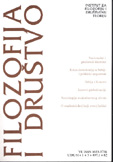Svakodnevni orijentalizam: Doživljaj „Balkana“/ „Evrope“ u Beogradu i Zagrebu
Everyday orientalism: Experiences of ‘Balkan’/’Europe’ in Belgrade and Zagreb
Author(s): Stef JansenSubject(s): Cultural Anthropology / Ethnology, Nationalism Studies, Post-Communist Transformation, Geopolitics, Politics and Identity
Published by: Institut za filozofiju i društvenu teoriju
Keywords: orientalism; Balkan; Europe; Serbia; Croatia; identity; discursive practices; nationalism; antinationalism; everyday life;
Summary/Abstract: On the basis of intensive ethnographic fieldwork (December 1996 – September 1998) this article analyses a set of orientalist discursive practices in the post-Yugoslav context with special reference to the ways in which they related to nationalist and anti-nationalist discourses of identification. Using material from both Zagreb and Beograd it represents an attempt to go beyond theoretical, literary and geopolitical debates and dissects mundane post-Yugoslav discursive practices. Such everyday orientalism surrounded the two opposite notions of ‘Balkan’ and ‘Europe’ and added up to a process of negative self-definition. This text conceptualizes ‘Balkan’ and ‘Europe’ as collectively sanctioned but contested cultural constructs which could be incorporated in this process. I argue that people essentialised those notions to a certain extent and that those essentialisms constrained practice and allowed strategic action, mainly through articulation with other dualisms, such as urban/rural and modern/traditional. As a discourse of identification, orientalism produced some sense of fixity for post-Yugoslavs who articulated it into their understanding of the world around them and of themselves. For many, the notions of ‘Balkan’ and ‘Europe’ provided discursive material with which they could relate their personal narratives to the larger stories of war and nationalism. In this sense, it helped constructing some continuity in these people’s narratives of self—even if only paradoxically by emphasizing discontinuity in the surrounding events. Many post-Yugoslav narratives of self were shaped partly on the basis of certain compatibilities between people’s everyday life experiences and possible variations on the orientalist theme.
Journal: Filozofija i društvo
- Issue Year: 2001
- Issue No: 18
- Page Range: 33-71
- Page Count: 39
- Language: Serbian

